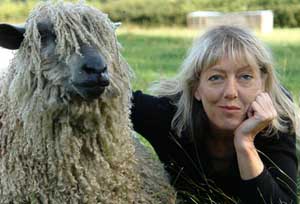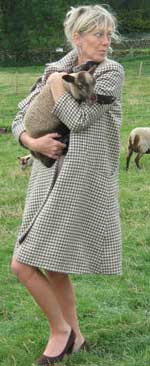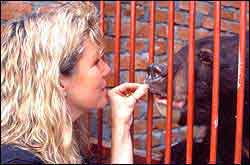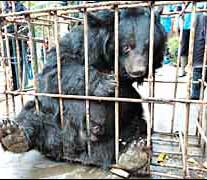|
TRIO OF BLONDE PIN-UPS
MEN's magazines traditionally feature pin-ups, so we have decided to provide our own selection of very special women, including a former pop singer, a TV presenter and a one-woman force for change in China.
FROM life as singer in an Indie band  group,'Edith's Strategy', Isobel Davies has become a star in not one but two other fields - as an ethical farmer and fashion producer. group,'Edith's Strategy', Isobel Davies has become a star in not one but two other fields - as an ethical farmer and fashion producer.
This attractive lady became interested in organic produce and set up her own business supplying home-delivery boxes of organic fruit and veg when she left the music business. In the course of that, she discovered that not only did sheep farmers burn the wool sheared from their sheep, because it was more costly to sell, but that many sheep were sent to the knackers yard because they were not 'perfect' - maybe lame or with a black spot or too young or too old.
 "I was horrified," she said. And so she set about tackling what she saw as a crazy situation, by saving sheep destined for the slaughterhouse and using their fleece to make fashionable styles, sold under her brand name Izzy Lane. "I was horrified," she said. And so she set about tackling what she saw as a crazy situation, by saving sheep destined for the slaughterhouse and using their fleece to make fashionable styles, sold under her brand name Izzy Lane.
"When I began my research in 2002 and saved my first 4 ‘butcher lambs’, I also discovered that our textile industry was on its knees. We are using the last of 51 worsted spinners and one of the last dyers in the Bradford area. Our cloth is woven at an ancient mill in Selkirk using Victorian machinery that has been operating for over a hundred years.
"Our knitwear is made with the lustrous, kemp-free fleece of the Wensleydale sheep, an endangered breed, numbering around 1800 in the world. Our dresses, skirts and jackets are made from the super-fine fleece of the rare and primitive Shetland sheep, used undyed in their beautiful natural colours. Our luxurious cashmere garments are made from the fibre of Scottish cashmere goats. Most cashmere fibre is imported from Asia. The annual production in Scotland is only 100 kilos each year." Isobel wears an Izzy Lane coat, left, and a men's cashmere sweater is featured in the SR Collection on Style p5.
She has a flock of over 500 rescued Wensleydales now and a veritable army of handknitters across Yorkshire, and believes she is showing that sheep can exist, be valued and be productive without becoming meat.
"We know the full provenance and authenticity of each garment since we have taken it from the fleece through the whole manufacturing process to the garment itself." she says. It's an inspirational story of one woman showing how ethical fashion can be reared in Britain and makes her a real pin-up girl. www.izzylane.com
BLONDE HOPE FOR BEARS IN CHINA
It takes one whole bear to make a bearskin helmet for one of the Queen’s Guards. How many bears does it take to make one medicinal potion?
Well, there are around 10,000 bears kept in miniscule cages  in China, their bile painfully extracted through catheters inserted into their abdomens, which is used in traditional Chinese medicine. And there is just one Jill Robinson working to persuade the Chinese authorities that extracting bile from the bears is not only cruel but actual poses a danger to public health. in China, their bile painfully extracted through catheters inserted into their abdomens, which is used in traditional Chinese medicine. And there is just one Jill Robinson working to persuade the Chinese authorities that extracting bile from the bears is not only cruel but actual poses a danger to public health.
We featured this remarkable lady in a previous edition of savilerow-style. She has received an MBE from the Queen for her work in Asia on animal welfare and now largely concentrates her efforts on saving the moon bears, as they are called.
In a region of the world not noted for its concern for animals, she faced what seemed like an insurmountable task when she first discovered the horrors of bear bile farming.
 She recognises that bile has been effective but reports that it can now be replicated cheaply in the laboratory and, more importantly for human recipients, this is much safer.This is the factor that she hopes will persuade the Chinese authorities to finally ban the farms when she presents a dossier based upon scientific research later this year. Recent developments at the highest level indicate that she is near her goal. She recognises that bile has been effective but reports that it can now be replicated cheaply in the laboratory and, more importantly for human recipients, this is much safer.This is the factor that she hopes will persuade the Chinese authorities to finally ban the farms when she presents a dossier based upon scientific research later this year. Recent developments at the highest level indicate that she is near her goal.
At a time when so many people in China are suffering from the results of natural disasters, it might seem that the plight of a few bears is irrelevant. But leaving aside the cruelty involved and the fact that the bears  are an endangered species, the risk to human health is a salutary warning – another one. are an endangered species, the risk to human health is a salutary warning – another one.
Born in Nottingham and brought up in North London, Jill went to live in Hong Kong in 1985 after marrying a British pilot, and worked first for the International Fund for Animal Welfare. It was in 1993 that she first discovered the bear bile farms, and was so moved by the conditions and the suffering entailed that she set up her own charity, Animals Asia, in 1998, specifically to concentrate upon ending this cruelty.
“ I knew it had to be an Asian group to tackle the problem, to liaise with the Chinese authorities and to have Chinese workers. We now have established good relations with members of the Chinese government, which has stopped issuing any new farm licences.”
Her aim is for Animals Asia to take over the farms and provide better conditions for the bears, which, because of their treatment, cannot be returned to the wild. Considerable financial support and veterinary skills will be required but this indomitable English woman is confident these will be available.
Meantime, Her Majesty’s Guardsmen continue to wear their bearskins as the search for a suitable fake fur continues. Given that they started wearing them after the defeat of Napoleon at Waterloo, perhaps its time they were consigned to the scrapheap of fashion. Maybe the Guards could offer to stop wearing bearskins if the Chinese will stop having bear bile farms. In Olympics year, it is worth a try.
To see the bears she has rescued and make a donation go to www.animalsasia.org
|